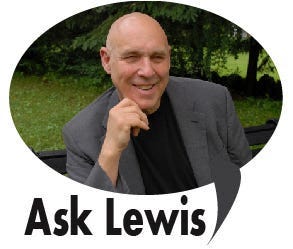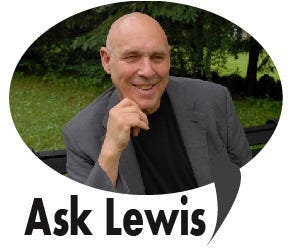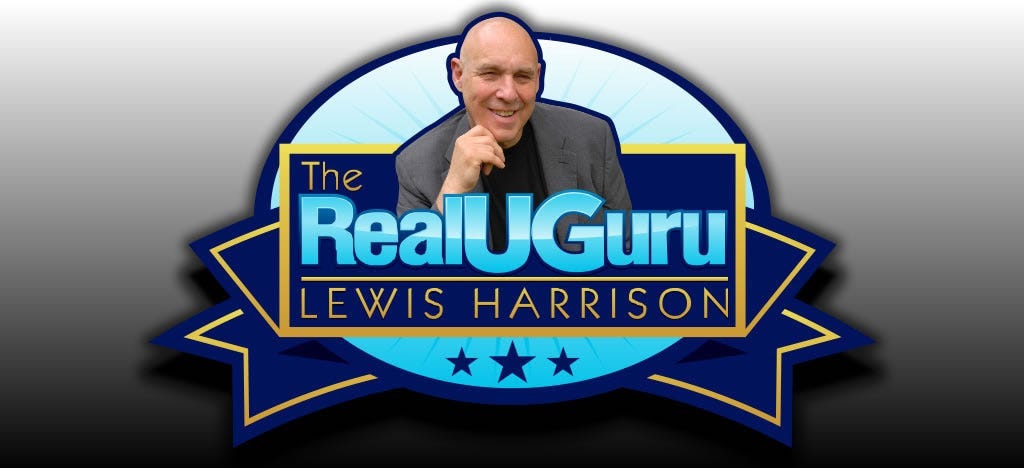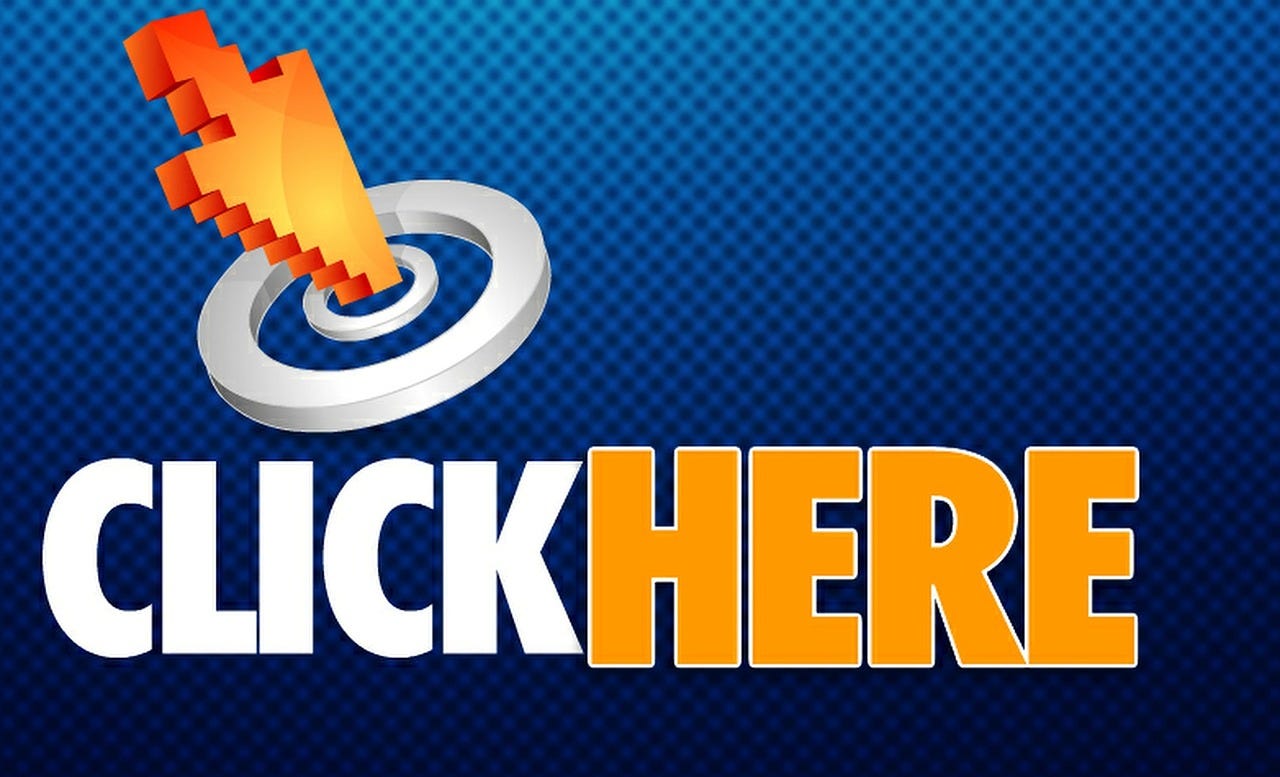The Ask Lewis Mentoring Method Module #1
Harrison’s Applied Game Thinking - HAGT - A Unique Coaching System for Peak Performance, and Meaningful Success
https://asklewis.substack.com/publish/post/132579384
Synopsis:
This first Module is concerned with showing you how to view life as a game that can be won.
Here is the video link for this module
AskLewis Method - Q & A Tutorial - Part 1 of 5
This video explores life hacks, tips, techniques, shortcuts, and strategies for creating manifestation, and abundance
Introduction to Game Theory
(Long Form)
In order to create new possibilities for greater success and transformation in your life, you will
need to embrace a new way of thinking.
The easiest way to change your thinking is to view life as if it is a game to win. In order to do
this, you will need to learn how games are structured and played.
I’m sure you have played games of some type in your life—maybe tic-tac-toe, checkers, chess,
cards, or even Rock-Paper-Scissors. If so, this idea will be easy for you to understand.
The Key Elements of Any Game (with Two or More Participants)
1. Playing environment, or game space. This might include a board, a video game app, or some
type of playing field.
2. Players.
3. Teams, if there are more than 2 players.
4. Rules.
5. Referee(s).
6. Official time allotment (quarters, periods.}
7. Penalties for rule-breaking.
8. Self-analysis and analysis of the competition.
9. Strategies and tactics, based on #8.
10. Chance or luck factor.
11. System for scoring.
12. Agreement as to when the game has ended.
13. A point where all agree, or a referee makes a decision about who has won (unless there is a tie).
When we look at nature, many creatures engage in play, and then grow out of it over time. As adults, humans often focus on games and sports socially, but, sadly, they remove the psychology of “play” and “gamer-thinking” from their business or professional lives.
Without a game-plan I do not believe you will easily move forward toward success, however you define it.
You can “win” the game of life and help others win it as well if you have clear intentions and a plan.
One of the defining elements of my method, which I call “HAGT - Harrison’s Applied Game Thinking,” is to ask a client to immediately define what their “endgame” is. By endgame I am referring to the concept that there is some desired outcome they are looking to achieve at the conclusion of the process.
One of the defining elements of my method, which I call “HAGT - Harrison’s Applied Game Thinking,” is to ask a client to immediately define their “endgame.” Endgame, in this context, is some desired outcome they are looking to achieve at the conclusion of the process.
So, I ask you now. What is your endgame? What is the result you want to see and experience at the completion of your project or your career?
Here are two quotes related to this line of thought:
"If you don't know where you're going, any road will take you there." This oft-cited but not-quite-accurate quote is from Lewis Carroll's classic children's tale, Alice in Wonderland.
“If you don’t know where you are going you will probably end up somewhere else?”
Yogi Berra
My take on this idea is that…
"If you don't know where you're going, any road will take you there, and it will probably be the wrong place, at the wrong time for the wrong reason.”
An Exception:
In the HAGT Method, isolating your desired outcome is not a rigid rule for everyone at all times.
For instance, if you are a writer, you may not need to know the ending of your book as you are writing it. Here, the goal may be simply to write. To write and do so consistently may be the
desired outcome. Here the game itself—the process of writing—is the actual endgame.
Physical Goals and Experiential Goals
For many people setting a goal relates to something physical like achieving wealth, a nice car, a fancy home, a beautiful or handsome mate, and influential friends. This is not what I am speaking of here, though achieving financial freedom is certainly desirable.
About Experiential Goals
What makes Experiential Goals so important in the HAGT method is that these are not greatly affected by radical changes in the external environment.
Let me illustrate this point here through one of my favorite stories about the distinction between physical goals, and experiential goals.
Living By the Sea: A Visionary Tale
“There was once two young people who lived near the ocean. They were named Sam and Kelly. They really loved the water, the waves and the salty air spraying across their faces on windy days. Each spoke of a future where they would have careers tied to the ocean.
After high school each of these friends went their own way, losing contact in the process.
About thirty years later they returned to the small ocean village, they had grown up in, and took a walk on the beach discussing the glory days of their youth.
As they discussed their lives they learned that each had stayed close to the sea, but that their individual lives had unfolded much differently.
Sam had reached for and vigorously sought out the physical things in life, starting as a commercial sailor. It was a rough and tumble life he chose, moving from job to job, experiencing different forms of stress, pressure, and dysfunction, moving from one physical and emotional port of call, to the next. Sam had experienced financial struggles, alcohol, and many hard relationships moving from project to project, battling all the way with life, trying to get the material things they had fantasized about having. Often this was done in vain.
Kelly, on the other hand, had never left their hometown other than to travel a bit, and see the world every year. Kelly had set up businesses built around the beach, and eventually owned many companies related to the water, while also experiencing all that had once been fantasized about.
Kelly had never imagined in youth, what they would do specifically or even physically. They just had a sense that it would be where the ocean met the beach. Ultimately, Kelly owned a restaurant, surfing and scuba diving services, boat rentals, a lifeguard training school etc. Kelly, delegated well to others, had a passion for all of these things, and did them well, also creating work for many of the locals in what had been a sleepy town with little work.
Kelly also carried a spray bottle filled with sea water, so when they wanted to feel and sense the ocean, they would close their eyes, listen to the waves rushing in and spray the sea water on their faceI will illustrate this point through one of my favorite stories - Living By the Sea—A Visionary Tale, about the distinction between physical goals and experiential goals:
“There were two young people who lived near the ocean. Sam and Kelly. They really loved the
water, the waves, and the salty air spraying their faces on windy days. Each spoke of a future
where they would have careers tied to the water.
After high school, they went their own ways and, in the process, lost contact with each other.
About thirty years later, they both met up again at the beach in their hometown and found
themselves discussing their glory days. As they talked, they learned that each had stayed close to
the sea, even though their individual lives had unfolded much differently.
Starting as a commercial sailor, Sam had reached for the physical things in life. It was a rough
and tumble existence, moving from job to job, experiencing different forms of stress, pressure,
and dysfunction, as they moved from one physical and emotional port of call to another. Sam
experienced financial struggles, troubles with alcohol, and many hard relationships, all in a
battle with life to get the material things they had fantasized about having. Much of their effort
was done in vain and they did not achieve the life they wanted.
Kelly, on the other hand, had never left their hometown other than to travel a bit every year.
They had set up a business built around the beach, eventually owning many companies related
to the beach, and experiencing all they had once fantasized about. They didn’t imagine what
they would do physically. They just had a sense that it would be where the ocean met the
beach. Ultimately, Kelly owned a restaurant, surfing and scuba diving services, boat rentals, a
lifeguard training school, and other businesses associated with the beach. Kelly had a passion for
all these things and did them well—along the way creating employment for many locals in what
had been a sleepy town with little work.
Kelly also carried a spray bottle filled with sea water with them wherever they went, so when
they wanted to feel and sense the ocean they would close their eyes, remember the sound of
waves rushing in, and spray sea water on their face.
The End!
The point here, of course, that one can have an easier, and meaningful life, training the mind to seek Experiential Goals rather the Physical Goals. Understanding the content of experience that you seek may bring you the best physical things as well and you won’t be a slave to them.
Game Thinking Summary – Let’s get going!
As we begin this coaching/mentoring process, let’s return to the concept of gamer thinking.
I believe you will find that approaching life as a game is a powerful tool for achieving
substantial success emotionally, mentally, physically, financially, and spiritually.
When you think this way, the world becomes a game board, a video game screen, or a field.
Let’s explore this idea concerning daily applications.
In any game there are…
players,
rules of engagement,
ways to keep score,
measures of how you are doing defensively, and offensively.
teammates, collaborators, and competitors.
Let’s explore putting this “gamer” concept into action
Gamer thinking can be extremely useful for your long-term Experiential Goals to fruition. When I say long term vision I am specifically referring to defining and choosing your future in terms of the content of experience you wish to have.
Now, let’s explore the steps required to put this gamer concept into action to achieve your long-term Experiential Goals (your endgame).
Identify all the things you know you would not be willing to do to achieve your desired endgame or outcome.
Consider what you might need to do/have/become in order to achieve the end-goal. You may need to separate these strategies into small, measurable chunks, including facts, lists of available resources, dates for achieving, etc. required to accomplish them. There is no right or wrong here, especially if you are acting on something for which you have a passion. The great anthropologist, Joseph Campbell, often referred to the idea of “following your bliss”—focusing and acting on a thing that is mentally, emotionally, and spiritually meaningful for you.
A key distinction in identifying your endgame is to find your bliss. Once you know where your bliss lies, it is easier to do what needs to be done. This, then, becomes the journey—a process guided by a clear intention outlining what is most important for you.
When to know where you are and what your desired result is, the journey can become an adventure and this adventurous journey then become its own reward.
Here are some thoughts about this process…
If the vision, strategies, and plan for moving toward your vision are well thought out and intuitively sound, then the journey can be a real joy, even with the challenges and obstacles you are likely to encounter along the way. Obviously, becoming wealthy just for wealth’s sake is not practical, rational, or wise.
Sometimes this process can be a bit overwhelming, especially for those who have just thought about what they want rather than what they need—and have never taken the time to consider what they would NOT do or WOULD do to get it.
Once your desired outcome is clear, it is wise to map out different strategies to get to that end result. Keep in mind that these need to be flexible since internal and external factors can change on a moment’s notice.
Once you have a basic program set up, it is important to stick to it.
So What is he Definition of Success in the HAGT Method
Success can mean different things to different people, but some general tips for achieving success include:
Set achievable goals,
Develop a strong and fulfilling work ethic,
Be persistent in the face of challenges,
Seek out or recognizing opportunities when they appear,
Live a life filled with love, compassion, empathy, wisdom, and beauty.
Modelling
Once your desired result is clear, the next step is modelling others who have been successful in a similar journey. To model someone is to observe what another person does and purposely shifting your behavior in order to improve achieve your goals, fulfill your vision, or your mindset. Initially developed by Albert Bandura beginning in the 1960s, modeling in psychology, consulting, and in life and success coaching has become a mainstream theory.
So, If you want to be successful is it wise to model the behaviors and success principles that others have mastered.
Sadly, many people have a misunderstanding of what success is. Success isn't a final destination. Rather, it's a journey moving towards the accomplishment of the vision that reflects your “bliss.” that matter to you.
What is great about this process is that you do not expect to achieve your desired result overnight. Rather, achieving your desired result is simply a by-product of the choices that will be making daily.
In the words of social psychologist Bo Bennett, “Success is not in what you have, but who you are.” Are you ready to learn how to be successful in life?
Here is a simple exercise to help you get started.
Write down what your end game is.
Now name some well-known people you admire and respect who have successfully achieved this very thing.
Google, and wiki these people and study their lives. Write down their success and failures.
Further Thoughts
Foundational Questions for Creating a Daily Schedule
1. Is there meaning in your life: A purpose you feel positive about?
2. Do you have a list of action and behaviors you have listed to bring this “meaning” into action?
3. Imagine these action and behaviors and immersively imagine that successful outcome.
4. If there a meaning in your life, think of one thing that might be an obstacle to you achieving successfully.
Answering these questions is important, for as the author Lewis Carroll stated…
“If You Don’t Know Where You Are Going. Any Road Will Take You There”.
This will give you a foundation for our next mentoring session…
As you know, there is no charge for mentoring or coaching with me, though your support is appreciated and helps me to serve many others without charge. If my work has served you please donate generously.
Learn more below
——————————————
We need your support so we can continue to make a positive and measurable difference in the world through education, motivation, inspiration, and transformation
We appreciate your financial support to the…
Ask Lewis Project through our partnership with The International Association of Healing Professionals (IAHP)
Learn about our programs in natural healing and complementary medicine.
What is IAHP?
IAHP is a philanthropic educational and mentoring organization dedicated to supporting wellness and self-improvement professionals, and well as offering classes, courses, and life and success coaching for the general public.
The International Association of Healing Professionals is passionate about helping individuals and organizations, to heal others, and creates self-improvement, self-development projects throughout the world through mentoring, coaching, and volunteer initiatives.
Our Origins
IAHP was founded in 1972 by Lewis Harrison, a practical philosopher, best-selling author of over twenty books, and the former host of a humor, and interview show, on NPR (National Public Radio) affiliated WIOX FM.
From the very beginning Lewis, and his team of advisors have been committed to providing support to all who need it free of charge.
We started with a vision that healing and helping wellness and associated professionals could make a measurable and positive difference in the world. Since that time, this vision has become a reality, as we have trained and offered motivational, inspirational, and content rich presentations to thousands of people.
How We Pay the Bills and Fund Our Many Projects
IAHF is supported through donations, crowdfunding projects, and fees from advanced success coaching. We have partnered with countless professionals and nonprofits to help them take their impact and missions to new levels of effectiveness, efficiency, productivity, and self-awareness
Donations to IAHP support two active projects
The Ask Lewis Project: Motivating, Inspiring, and Informing on all areas if self-improvement through articles, videos, blogs, and podcasts.
The RealUGuru Project: One to one counseling for those seeking to connect with the Guru within. Here we guide people to a more spiritually oriented, happier, meaningful, and purposeful life.
More on the The Ask Lewis Project
Here we share personal development and self improvement tools, techniques, methods, and life hacks, to help individuals, and organizations develop capabilities and potential, build human capital, facilitate financial freedom, enhance quality of life and the realization of dreams and aspirations.
Self-improvement may take place over the course of an individual's entire lifespan and is not limited to one stage of a person's life. It can include official and informal actions for developing others in roles such as teacher, guide, counselor, manager, coach, or mentor, and it is not restricted to self-help.
These are our goals at IAHP. Your generous donations help support this work.
Please donate now by clicking below…
Learn about our programs in natural healing and you can also donate below…
Contact us at: LewisHeals@gmail.com
——————————————
If you enjoyed and benefited from this Module and would like to take the more advanced course in creating positive power and influence, Email me at LewisCoaches@gmail.com and let’s schedule a short chat or Zoom call to find out how I can help you solve problems, and get your needs filled.
Consider this Module as a stepping stone into longer and more advanced courses that also include personal mentoring and coaching.
If you want to learn more about the intermediate and advanced Self-Improvement Lifestyle Courses, just e-mail me at LewisCoaches@gmail.com, and we can schedule a 15-30 minute conversation to explore how these courses can help you simplify your life, transform your thinking, and help you to solve your specific problems.
——————————————
About Lewis Harrison: Lewis is a public intellectual and has been mentoring and coaching visionaries, world class athletes, thought leaders, and individuals seeking to become more effective, efficient, productive, and self-aware for over half a century. The former host of an NPR affiliated radio show, he is the author of over twenty best-selling books on self-improvement, self-help, personal transformation, and human potential, and has created many classes, courses, and seminars on these subjects
Lewis produces a regular Podcast “The Self-Improvement Show” at: https://www.youtube.com/@asklewislewisharrison9755
Lewis is the administrator of the Eastern Mystic Group on Facebook. Join us for free at https://www.facebook.com/groups/1007277182635973
——————————————
Testimonials
Here is what Jack Canfield, the co-author of the Chicken Soup for the Soul Series and other thought leaders have to say about Lewis and his work.
“Lewis is amazing…. I recommend him to anyone who wants less stress and more energy.”
Jack Canfield, Co-author, The “Chicken Soup for the Soul “ books and star of the movie “The Secret”
“Lewis, your program was one of the first steps I took in the process of defining my interest in alternative medicine and for that I thank you. It has been over 45 years and I am continually amazed when I look back upon how easily and quickly one step has lead to the next. Thank-you for being there to assist in laying the foundations for all my future studies.”
Robee Fian L.Ac Former President American Association of Oriental Medicine (AAOM)
If you would like to connect and follow all of my entries throughout Social media just click below…
The Life Strategies Playbook & Mentoring Program
My 7 Best Social Media Platforms for Spiritual Growth and a Self-Improvement Lifestyle
Many have asked me to create and organize a list of links to all the platforms where I post information, blogs, newsletters, vlogs, resources, webinars, podcasts, videos, courses and other services. Please check them all out, subscribe, donate, and share with your friends and peers…













You are right on track for success here. - Lewis
Thanks for the great task items. I had them in my head but lovely to see them written down to reflect on and move forward from.